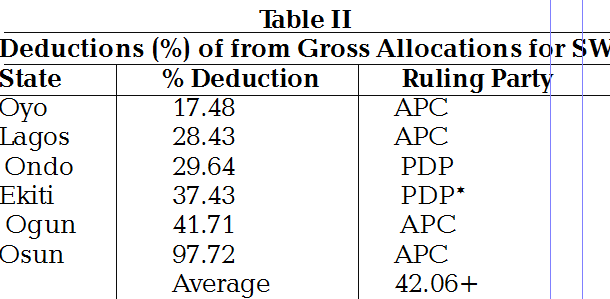Contrary to the conventional wisdom in the South, most states of the North are very conservative in the use of loans.
They are risk averse. The unexpected truth is that it is the revelation that the South-West had been the one prone to questionable use of loans and advances to fund projects which have zero per cent return on investment.
The average deduction from the allocations from the Federation Account to the states for September 2015 was 20.95%. But with the exception of Oyo State, which had deduction of 17.48%, all the other states in the zone recorded deduction from source of over 20%. See table below.
hat is double the national average in percentages. And only two states – Lagos and Ondo-are among the top ten in terms of the allocations from the Federation Account. That should serve as a wake-up call to the state Houses of Assembly – before the roofs cave in.
Many states of the federation got into commitments which they could only discharge if oil prices were above US$90 per barrel.
Ekiti State deductions need to be explained. They represent, mostly, deductions for loans and commitments made before Governor Fayose took over. So, to some extent, he is a victim of commitments made by his predecessors.
Even with that explanation, it is still a fact that governors in the South-West, irrespective of political party, have committed their states to deductions, on account of loans taken when the monthly allocations to states were about twice of what they are now.
Even the N389bn allocated to the three tiers of government, which is about half of what they received in November of 2013, might turn out to be a huge sum compared to what they can expect in 2016.
All available information point to crude oil price and volume sales dropping drastically below the levels we now experience.
The beginning of 2016 is only three weeks away, and January sales are already known; the price and volumes are well below what we had in September this year. So, every tier of government can expect to receive less in January 2016 than they got in September. Yet, the deductions will continue. It is quite possible that some states might receive nothing in January from
Abuja. They might even be asked to bring more money to repay their commitments.
Technically, an entity – nation, state, local government, private company, NGO – is bankrupt when it can no longer redeem its pledges. When governments can no longer pay salaries, pensions, gratuities, contractors etc, as and when due, they are going to trigger a massive wave of defaults which can only be called bankruptcy.
At that point, it will no longer matter to those they owe whether or not the funds were judiciously spent on “innovative programmes”, many of which become unsustainable or abandoned projects, they will press for their money.
Zamfara already feels the lash; as one creditor obtained a court order to seize the funds in its bank accounts. More states face the embarrassment in the near future.
The threat of states bankruptcy is real. Only a fool will ignore it. The only question left to address is: What are we going to do about it when our states become economically unsustainable?
Vanguard…….
This page has been viewed 387 times


























